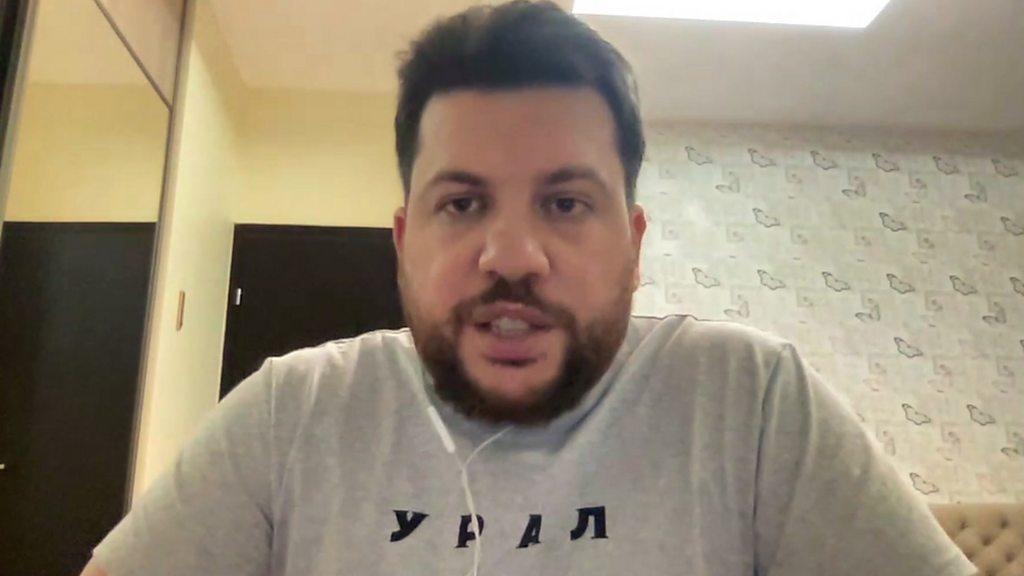Russia Navalny trial a 'low point' in EU-Russia relations, says Borrell
- Published
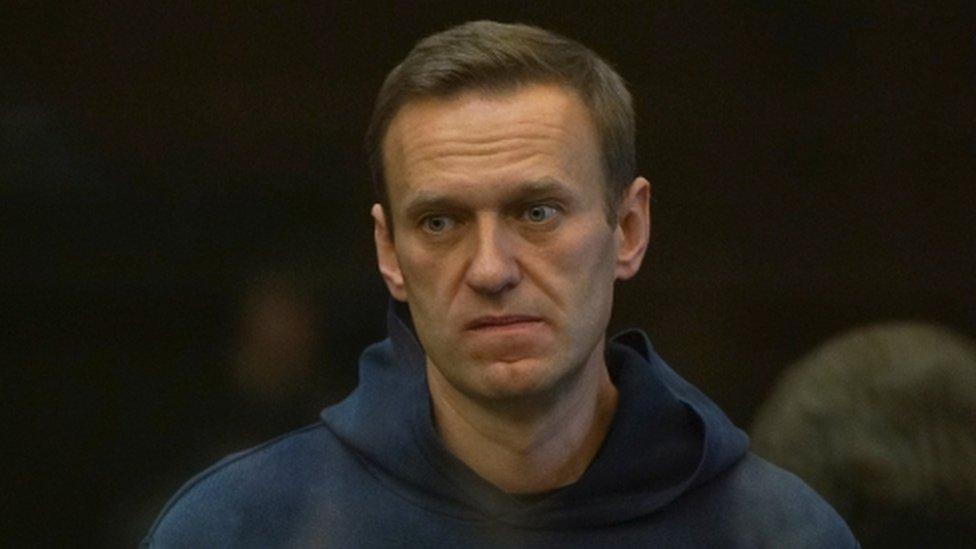
Alexei Navalny, who is in jail, claims the case against him is fabricated
The EU has told Russia the case against jailed Putin critic Alexei Navalny is a "low point" in their relations, as the dissident faces a new charge in court.
EU foreign affairs chief Josep Borrell met Russian Foreign Minister Sergei Lavrov in Moscow, with new EU sanctions over Navalny's case a possibility.
Navalny is back in court, accused of slandering a World War Two veteran who appeared in a pro-Putin video.
On Tuesday he was jailed for nearly three years in a fraud case.
Navalny, 44, accuses President Vladimir Putin of ordering the nerve agent attack that nearly killed him last August, but the Kremlin denies involvement.
The Kremlin critic was jailed for violating the terms of his 2014 suspended sentence for fraud - a case he ridiculed, saying the Russian authorities knew full well that he was getting emergency medical treatment in Berlin last year. He says the cases against him are trumped-up, intended to silence him.
He was taken into custody when he returned to Russia last month. His treatment by Russian authorities has drawn condemnation from the EU, the UK government and Europe's main human rights watchdog, the Council of Europe.
Thousands of his supporters have been arrested in recent days; many were held when they defied heavy security on the streets of Moscow and St Petersburg after he was jailed on Tuesday.
'Human rights issues essential for common future'
In Moscow Mr Borrell said "certainly our relations are under severe strain and the Navalny case is a low point", as he met Mr Lavrov. In a press conference afterwards, Mr Borrell said he had conveyed the EU's deep concern and reiterated the bloc's appeal for Navalny's release, as well as the launch of an investigation into his poisoning.
"While we fully respect Russian sovereignty... the European Union considers issues related to the rule of law, human rights, civil society and political freedom are central to our common future."
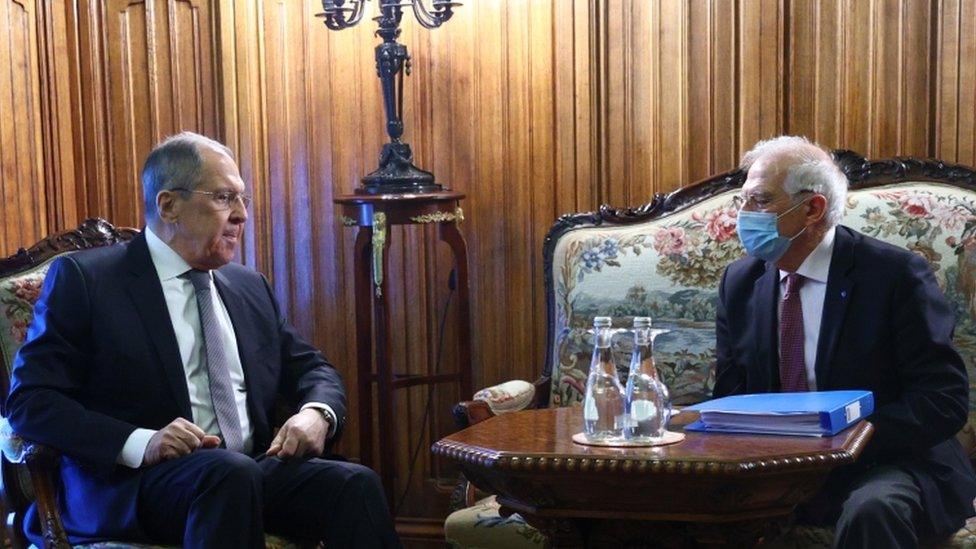
Mr Borrell (R) reiterated the EU's call for Navalny's release
The Russian foreign minister warned of unpredictable consequences if relations worsened further, adding that both sides were keen to have broader dialogue in areas where they agreed.
He said relations "are not at their best, including due to one-sided, illegitimate restrictions introduced by the EU under trumped-up pretexts".
On Thursday, US President Joe Biden said Navalny "should be released immediately and without condition", describing his case as "politically motivated".
In October the EU imposed sanctions on six top Russian officials and a Russian chemical weapons research centre, accusing them of direct involvement in the poisoning of Navalny. Russia retaliated with tit-for-tat sanctions. It disputes the finding by Western experts that Novichok - a Russian chemical weapon - was used.
Sanctions will be on the agenda again when EU foreign ministers meet on 22 February. But Mr Borrell said that "there is no proposal for the time being by any member state" regarding further measures.
Russia remains a key economic partner for many members of the 27-nation bloc, and Germany's Nord Stream 2 gas pipeline project with Russia is highly controversial.
Alexei Navalny: what you need to know
The slander case against Navalny dates back to last June, when he tweeted that celebrities and 94-year-old war veteran Ignat Artemenko, who appeared in a pro-Putin video, were "a disgrace to the country. People without conscience. Traitors".
The video was about a controversial constitutional reform, proposed by Mr Putin and then passed after a referendum. It paves the way for Mr Putin to get re-elected, if he runs for president again.
If Navalny is found guilty in this latest trial, he will face a fine or community service, his lawyer has said. The law was changed to make the alleged offence punishable by a jail term, but the Navalny case occurred before the law was changed, according to his lawyer.
What has Navalny said?
In an Instagram post from jail, he urged his supporters to resist "intimidation" and insisted they could still "liberate" the country from the "thieves and occupiers" in charge.
Navalny said he still felt like a "free person" because of his "belief in the righteousness of my cause". He described his treatment since his return to Russia as "Putin's personal revenge on me... or the fact that I survived, that I dared to return."
He thanked his supporters, who have held two weeks of demonstrations in dozens of cities.
"Do not allow yourself to be intimidated. Don't allow yourself to be fooled by an illusion of strength and swagger," his statement said.
"They can only hold on to power, using it for their own enrichment, by relying on our fear. Instead, by fighting our fear, we can liberate our Motherland from the little band of thieves and occupiers. And we will do this."
Hundreds of protesters in Moscow were detained by police
How have his supporters responded?
Mr Navalny's Anti-Corruption Foundation (FBK) said it had decided not to stage protests during the coming weekend, in the interests of preserving itself long-term.
FBK manager Leonid Volkov warned that new rallies could "paralyse" the work of the Navalny camp, following mass arrests over the past two weeks.
He said street protests would resume in the spring, adding that the team was also focusing on parliamentary elections scheduled for September.
Related topics
- Published16 February 2024
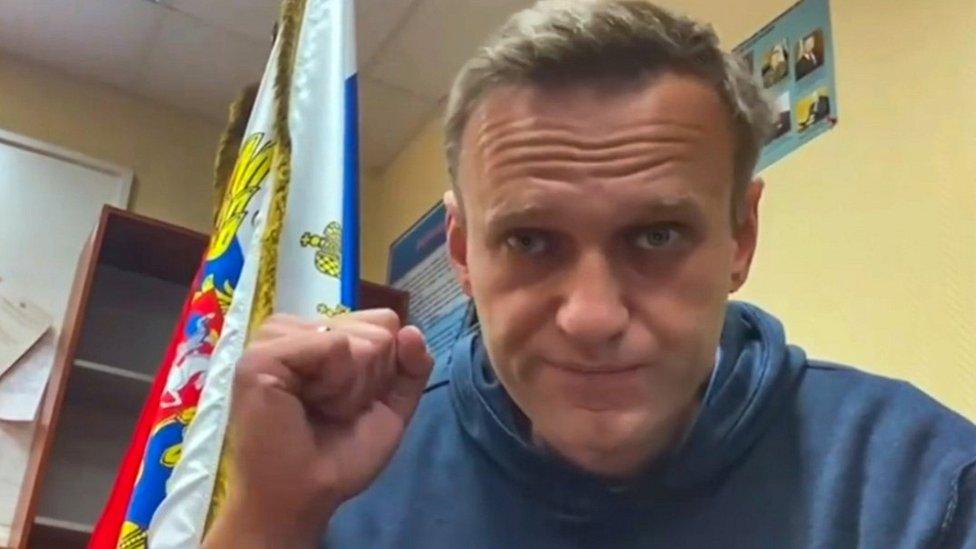
- Published30 January 2021
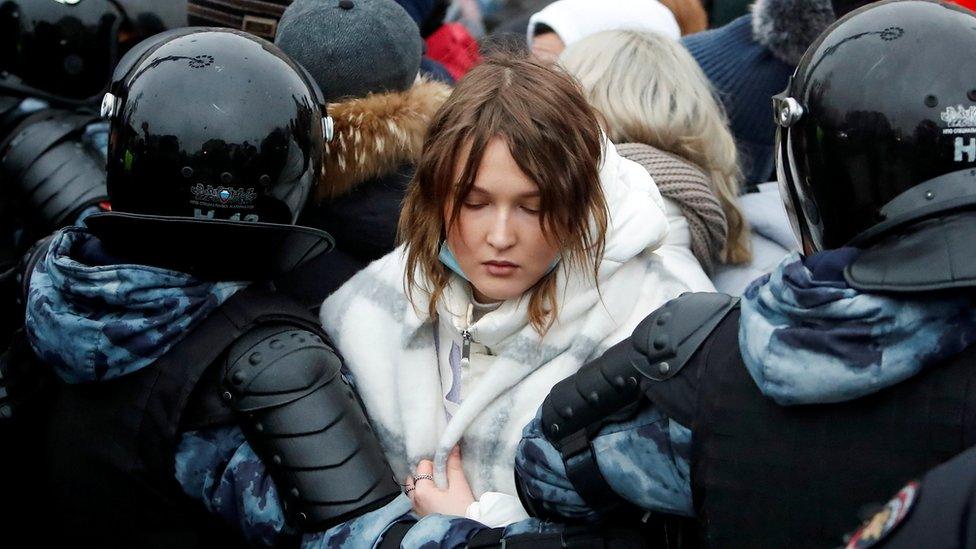
- Published31 January 2021
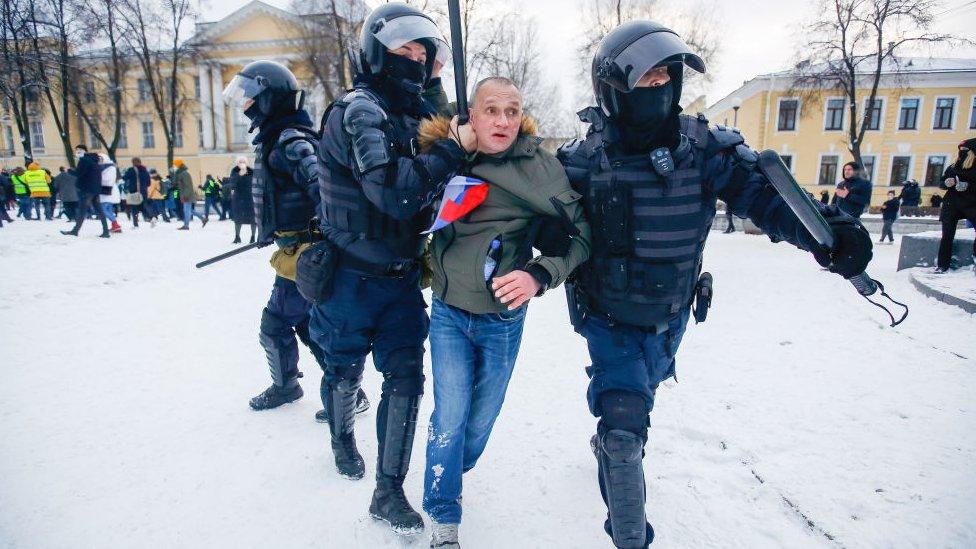
- Published29 January 2021
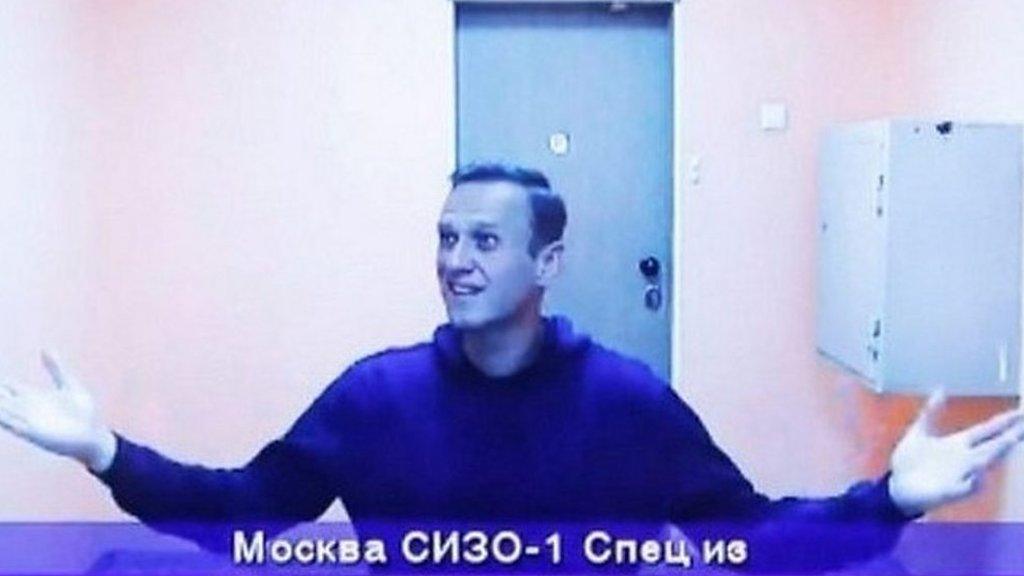
- Published23 January 2021
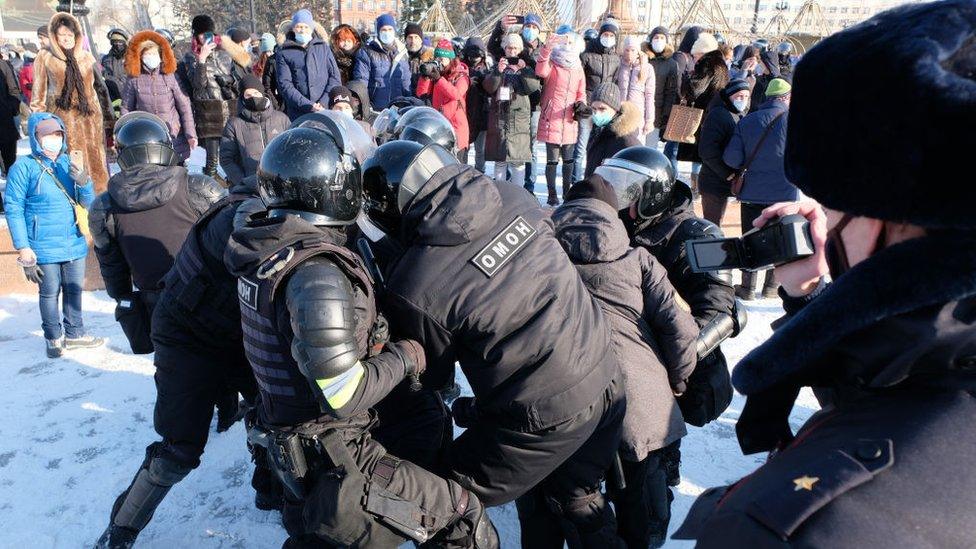
- Published27 January 2021
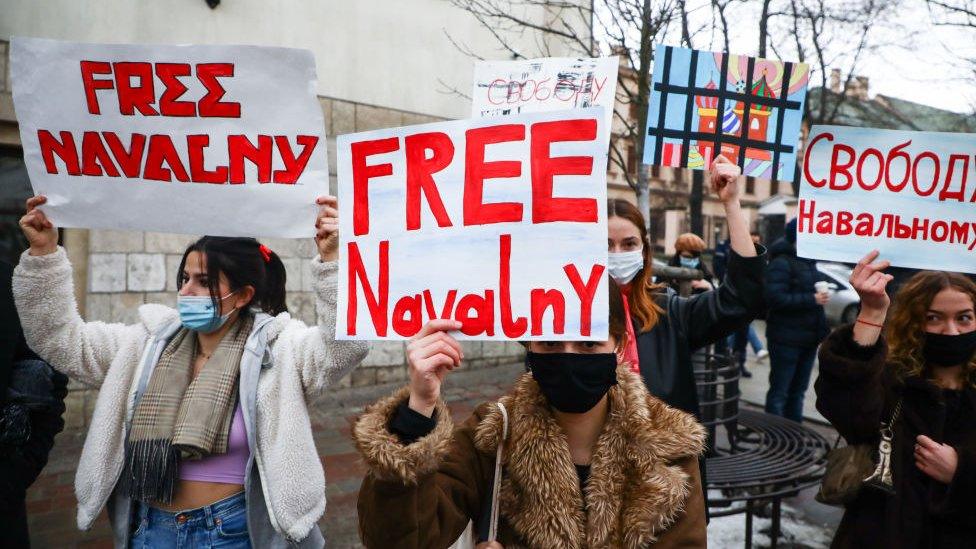
- Published28 January 2021
